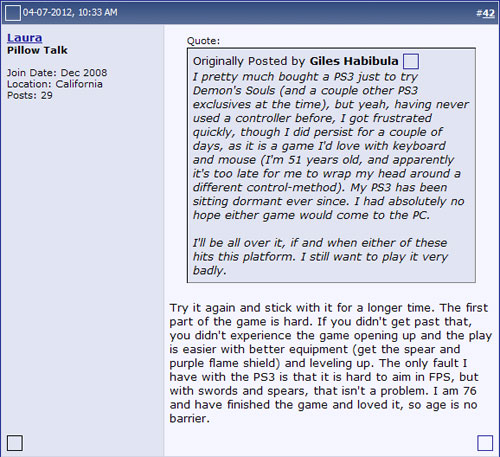
(Source.)
Recent Posts
- Culture war games: the revolt of the elites
- Culture war games: think about the unthinkable
- Culture war games: a line red from blood
- Culture war games: those to whom evil is done
- Culture war games: power squared
- Culture war games: the mighty miss
- Culture war games: the Midas disease
- Culture war games: the sword and shield of surveillance
- Culture war games: self-congratulation and selective memory
- Culture war games: self-licking ice-cream cones

This is going to become less unusual as the decades move on. Video games as a public phenomenon started in the 70s and we’re now forty years on from that.
In the future, I wonder whether people will perceive it as normal or will continue to generate one of those “it’s amazing, i have a cool granny who loves the Wii!!” type reactions.
My amazement has less to do with the fact she’s a senior gamer (see Old Grandma Hardcore) and more to do with the fact she’s one badass senior gamer. Demon’s Souls has a reputation for being a brutally difficult game, one that intimidates a lot of gamers regardless of age, so the fact she completed it is pretty damned impressive to me. I also love how the 76-year-old gamer is encouraging the disheartened younger gamer, a 51-year-old man, to keep at it.
There are sites specifically geared towards senior gamers but this is still an unusual gaming demographic which gets very little coverage by the mainstream gaming press. Most conversations about games still revolve around the 18 to 35 demographic — probably unsurprising since the bulk of the coverage is by game journalists from that very demographic (with the older ones shifting from editorial positions to management) — but I suspect we’re going to see some interesting things in audience expectation, gaming themes and gaming coverage in the next decade as the greying of 80s kids generation of gamers continues apace.
I think my response came out more cynical than it was intended. I just meant will it become commonplace for those in the retirement decades (at least, if retirement exists in the future, austerity blah blah blah) to be game experts. Generations that were raised on games and followed them through their middle lives will undoubtedly hang on to their gaming enthusiasm.
When life gets heavy with family and work commitments, gaming retreats into a corner and sometimes disappears completely. Time is the enemy. But once retired, time is no longer the enemy, but I wonder if questions of physical condition start to get in the way. My father, for instance, used to be an avid game player but has eye problems which makes playing anything other than sedate games impossible. We used to play head-to-head two player games all the time… but that life is over.